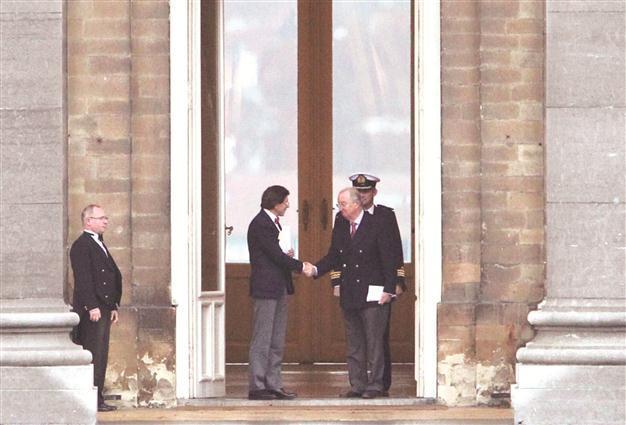Belgium breaks deadlock
BRUSSELS

Belgium’s chief negotiator in charge of forming a cabinet Elio Di Rupo (L) shakes hands with Belgian King Albert after a meeting at the Laeken Royal Palace in Brussels on Dec 1. REUTERS photo
King Albert II named Elio Di Rupo as the first French-speaking prime minister in nearly 40 years late Dec. 5 in one of the final steps before his team formally ends the record 541 days the country has gone without a government.The swearing-in ceremony yesterday was a long-awaited relief to the nation of 6.5 million Dutch speakers and 4.5 million French speakers who long ago grew frustrated with the deadlock between politicians over linguistic differences.
A royal statement late Dec. 5 said “the King received Elio Di Rupo at Belvedere Castle and named him prime minister.” The 60-year-old son of Italian immigrants thus completed a remarkable journey from childhood poverty to become the leader of Belgium. He will lead a grand coalition of Socialists, Christian Democrats and Liberals, each split into Dutch- and French-speaking parties.
Di Rupo will be the first Socialist at the helm since 1974. He will also be Europe’s second openly gay head of government after Iceland’s premier. After a June 2010 election failed to produce a decisive victor, the country’s feuding politicians, who are split both politically and by Belgium’s widening language divide, were unable to strike a coalition deal for months. Di Rupo for weeks has been finessing a government platform for six parties across the political spectrum with enough combined parliament seats to govern.
Di Rupo’s cabinet includes six portfolios for other French-speakers from southern Wallonia and six for Dutch-speakers from wealthier northern Flanders, which accounts for 60 percent of the population of 10.5 million. The prestige foreign affairs portfolio would go to current caretaker finance minister Didier Reynders, a French-speaking liberal.
Absent from the talks and the coalition, however, is Belgium’s biggest party, the separatist New Flemish Alliance (N-VA) led by Bart De Wever. De Wever has dismissed the coalition as “a minority government for Flanders, imposing cuts that a majority of Flemish will have to pay for.” Many in wealthier Dutch-speaking Flanders feel their taxes are financing the poorer French-speaking south. Di Rupo will outline the coalition 180-page platform to parliament today, with the new premier then free to join this week’s crucial European Union summit.
Now the government has a lot of catching up to do, especially when it comes to the economy. Just 10 days ago the credit rating of Belgium was downgraded as high debt caught up with extended indecision on the government makeup. One day later, Di Rupo and his partners had agreed on a budget meant to meet the demands of the European Union and calm nervous markets. The EU welcomed the breakthrough and said EU officials would soon review the budget text to see if it meets the recommendations of fiscal rigor and increased competitiveness.
Compiled from AP and AFP stories by the Daily News staff.
















